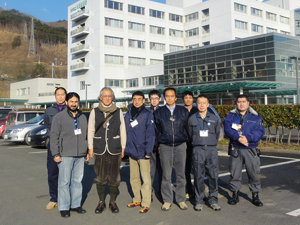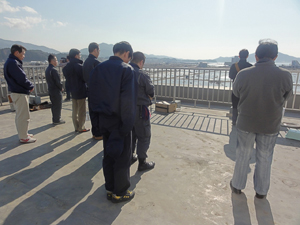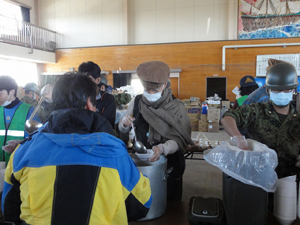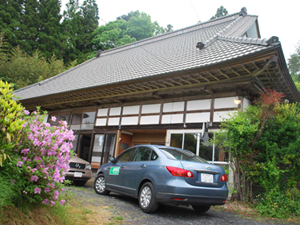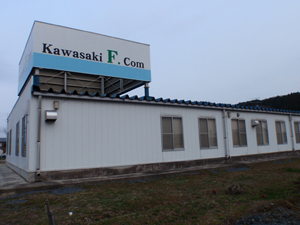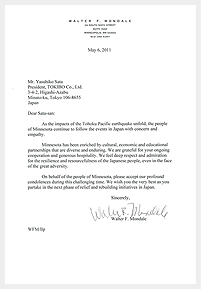
I am pleased to announce the establishment of Rentai Tohoku Foundation (which can be translated as Solidarity Tohoku Foundation), and organisation that provides support to the disaster-affected areas of Tohoku. Our dedicated website has been launched to appeal for cooperation from all parties who care.
I have been managing Tokibo Co., Ltd. (formerly known as Tokyo Kiaki Boueki Co., Ltd.
http://www.tokibo.co.jp/) and its affiliated companies, as their president for over 30 years since I was 31 years old.
Our main business is both importing,/distributing and manufacturing advanced medical devices. Companies we own in Orange County, California, USA and Besancon, France are manufacturing life sustaining mechanical ventilators, and implantable shunt valves used for hydrocephalus treatment, respectively. The number of employees both abroad and at home totals approximately 600.
Being deeply involved in the medical business for such a long time, I have always had a great awareness for people's welfare and happiness through good health.
On the terrible day of 11th March 2011, when the Great Eastern Japan Earthquake, and subsequent enormous Tsunami hit, I was in Newport Beach, Orange County, California, ready for the 30th Anniversary celebration of one of our companies that was to take place the following day.
Because of the earthquake, telephone services to and from Japan were interrupted and I lost almost all communication with Japan, until the apocalyptic scenes of the earthquake and tsunami were broadcast on television, leaving me speechless.
Upon my return to Japan a few days later, I felt the need to witness firsthand the reality of the devastation and travelledto Tohoku on 31st March with some of my staff and friends. First, we visited our important client hospital in Ofunato, Iwate prefecture on 1st April. Then, we drove southward to Rikuzentakada, Iwate, where eight of our group gathered on the rooftop of the damaged building of Takada Hospital and joined in with the reading of Hokke Sutra (the Sutra of the Lotus Flower) by one of our company employees for the repose of the victims' souls.
After that, we drove down to Ishinomaki and took a close look at the disaster damage in the area.
When we arrived at Minato Primary School in Ishinomaki, our final destination, our friends from Humanity First (
http://humanityfirst.org/) had already been working hard to provide meals for evacuees. We joined their efforts and helped them with meal preparation for one day. It was as much as I could do. But while serving food such as a dish of curry to 500 or more people in a long queue, I came up with the idea that the most important thing I could do as a volunteer would be to provide support to these devastated people who lost loved ones, homes and belongings and help to restore their self-esteem and to rebuild their lives.
On the 11th April, we set off for another tour of Tohoku to see the remaining damaged areas. We went to Higashimatushima, Minamisanriku, Kesennuma and finally Ishinomaki, where we joined in with the supper preparation at Minato Primary School like before. On the following day, after visiting a high school in Kamaishi, Iwate, we drove from Otsuchi to Kuji. En route, we stopped the car every now and again to walk about in the affected towns and villages. At Tarou-Chou, we stopped at a temporary morgue to pray for the victims. On the 13th, we returned to Minato Primary School in Ishinomaki and again, joined in with lunch preparation.
On the 6th May, a friend, who is an owner of an octopus dumpling shop, joined our third tour of Tohoku. Thanks to him, hundreds of evacuees based at Watanami Primary School were able to taste some dumplings. Due to the large number of evacuees, and the length of time it took to cook the dumplings, the serving per person was small, but I hope that they enjoyed the flavour for a change.
As mentioned above, I believe that providing support for the earthquake survivors to become self-reliant, is the key tothe restoration of Tohoku on a mid- to long term basis. Through the Internet I looked for a place to function as a hub of our volunteering activities. I was fortunate to have become acquainted with a family doctor in Kawasaki, Ichinoseki city and a Sendai-based junior high school teacher who has a 150-year-old house in Senmaya, near Ichinoseki, which is rented out to volunteers at a very low rate. Thanks to them we have placed our "bases of operation" at these two properties.
Two of our staff members have been assigned there permanently since mid June.
Though I did not have the privilege to meet the late Mr. Hisashi Inoue myself, I have read a few of his works and respect him deeply. I find that his "Kirikiri-Jin" would deliver the most important message to instil in the people of Tohoku, a sense of self-reliance. I therefore secretly wished to have our base in the place after which "Kirikiri Country" in the book was modelled. When I realised that our bases are actually in the Ichinoseki area, I was struck by the serendipity of it. Both properties in Kawasaki and Senmaya, are ideal for our volunteering activities in the Sanriku area as it takes only 1 hour 20 minutes to Ishimonaki by car, 30 minutes to Kesennuma, and 1 hour or so to Ofunato. Also, Ichinoseki Station on Shinkansen Express is only 30 minutes away.
Hereunder is listed some of the activities that we have embarked on:
1)As we have been joining efforts with Humanity First for meal services at evacuation shelters, we would like to continue co-operating with them to provide more efficient services, based on the needs and requests from the local people.
2)We had an opportunity to get to know local fishermen, especially oyster farmers and seaweed harvesters, who suffered the great damage as a result of the tsunami. In order to assist them in recovering their losses, we are giving them the necessary guidance and physical supports at Katsurshima, Urato Islands off Shiogama coast.
The national and prefectural policies for the reconstruction of fishery ports/harbours have started to be announced. The fishery industry in Tohoku will face a drastic transformation. Such a transformation would include the incorporation of individual fishermen into corporate enterprises, the threat of new comers into fishing industry , reconciliation among the existing power interests of fisheries cooperatives for further promotion of marine sports and so on. Those who are in the fishery industry may be forced to bear a painful burden through the process. However, the time has come when subsidies from the government can no longer be counted on and the fishing industry must make itself the efforts to secure administrative funds. We expect them to bravely overcome this drastic change.
Promoting support funds from the private sector as well as setting up foundations for financing the restoration of the fishing industry are also very important. Generous support from many people are most significant.
I met a young man who came up with an idea of a "One Unit Sponsor" system to help oyster and seaweed farmers. The idea is that by buying one "unit" which costs 10,000 yen, the sponsor will be able to help fishermen to buy lost fishing tools or repair farms etc., and when the business is restored, receive fishery products according in return for the number of "units" they have bought. Up to now, the total number of units sold has reached about 150,000, and the amount of money that this young man fishery cooperative collected is 150 million yen. I would like to pay my deep respects to his remarkable ability and powerful idea.
The fishery industry should realise that changing times demand them to make such self-reliance efforts. Indeed, God helps those who help themselves.
3)Since the first meeting on the 30th April, we have so far had three meetings/consultations with earthquake victims, intellectuals and my friends.
Not only the local fishermen but also strawberry and mushroom farmers attended at these meetings and had a lively exchange of opinions. Though the path toward total reconstruction remains unclear, we were able to share a meaningful time and reaffirm our pledge to overcome this massive crisis. We will continue to have meetings in the future as we believe that it is vital for all of us, coming from different backgrounds, to get together and exercise our ingenuities to support the people of Tohoku to stand up again.
Also, such opportunities would enable those suffering from the earthquake and tsunami to help each other.
4)Rentai Tohoku has made available a large camping car, a 1-ton truck, and 5 four-wheel drive SUV cars for a free car rental service (except fuel expenses) for local people. As almost 400,000 cars were destroyed by the earthquake and tsunami, many people, without cars, are deprived of means to find a way to support themselves. More cars are needed for our free-rental service.
We would therefore be truly grateful if you could offer vehicles to provide such a service to more people.
5)We have received an offer from abroad related to temporary housings. We will intermediate the negotiations between the needs and the offer.
6)Employment support is another significant role for Rentai Tohoku. As I heard that dozens of graduates' job offers have been cancelled at a high school in Kamaishi, I visited the school to find out the actual circumstances and explore possibilities to support them. As a potential remedy, I offered 5 to 10 temporary posts on one-year contract basis either in Kamaishi or in other cities. However, surprisingly, the high school was only interested in permanent posts and none of the turned-down graduates applied for the job. Regrettably, we have not heard from them on this matter.
A while later, there was a television news broadcast that reported a similar story about a high school in Ishinomaki. According to the report, as a number of new graduates were left jobless, the concerned Chuou-ward in Tokyo created 10 special temporary posts starting from May and tried to recruit those who lost their job offers. After two weeks of enthusiastic persuasion, it turned out that there was only one graduate who applied for the post.
I was interested in this story and visited the person in charge of this project at Chuou ward office, to discuss the reasons.
We came to the conclusion that no matter what the situation is, apparently young people in Tohoku do not wish to leave home or find a job away from home. We thought that if they find a job elsewhere, they would be able to send some money to their parents back home. However, such an idea seems to be completely alien to these young people. Needless to say, the towns and industries in the disaster areas are almost completely destroyed and jobs are next to none. In other words, an "Economic Tsunami" is surging across the devastated Tohoku. I truly believe that as many people as possible, especially youngsters, should seek a way out from this crisis and get a job elsewhere to financially support their families and hometowns.
7)There are many good people around the country who are organising events to support Tohoku. We would like to co-operate with these people and already have a plan to support a summer event in Kesennuma.
8)A little away from Ichinoseki is a production region of famous Maezawa beef cattle. I have met two brothers who are cattle farmers raising Kadozaki beef cattle which are kin to Maezawa beef cattle. As the farm is close to the disaster area, their restaurant is suffering from a severe decline in customer numbers. As I am planning soon a party in July inviting 120 to 150 guests at a hotel in Tokyo, I asked the master chef to use their beef for the dinner. Though this is an unusual request, he kindly tried the meat and accepted my request for the sake of supporting Tohoku. I am most grateful for the hotel's warm understanding. I hope that this opportunity will open up more business chances for the struggling brothers.
I would kindly ask you too to join us in this line of support activities.
9)Over 30 years, I have had a photo gallery in Tokyo, as a "food for thought" business. (
http://www.pgi.ac/) Through the activities at the gallery, I came to know a number of prominent photographers both at home and abroad. Though I need to talk with my staff, I am thinking of presenting a photography exhibition and other cultural events related to Tohoku.
I often hear that many people wish to actually do something rather than simply send money. They want to have a feel that they are being of help and making some contribution.
If so, the most important volunteering work is, in my opinion, to go to a disaster area, witness the damage, talk to sufferers, think and provide useful opinions to them, and always stay by their sides. And we must help them to become once again self-reliant as the difficult situation in Tohoku will continue for a some more time.
It is often pointed out that there are needs of mental health, but we, non-medical professionals, can also be useful in this area.
Many of you may be at a loss about where to go or what to do. If so, please do not hesitate to contact us.
The spirit that supports my own volunteering work is the famous poem, "Rain, I will not be defeated" by Kenji Miyazawa.
North, south, east, west, we must walk about and think hard what we can do to help the sufferers.
Discussing things in the virtual world of the internet may be one thing, but we actually meet and build a connection with people in Tohoku. We therefore call upon all to walk about in the disaster area and think. In fact, let us not only walk but run together and think of the way to restore this country. This is the one and only way for us to stand up again from this tremendous disaster, "The Third Defeat in War" so called.
Rentai Tohoku needs sizable human resources as we aim to continue assisting Tohoku for a longer period. Experts in various fields are most welcome to join our volunteer team. Please contact us if you are interested.
Finally, because our means are limited, our support services will be provided mainly in Sanriku area in Tohoku. However, we are also concerned about Fukushima.
Several years ago, I launched a campaign to return a forgotten A-bombed head of Madonna of Urakami Cathedral in Nagasaki to the original place. The statue was destroyed by the atomic bomb and kept at a monastery in Hokkaido and then at a miserable place in the near-by house of the Uragami Cathedral for a long time as if it was completely forgotten.
As a result of my campaign, the long forgotten Madonna was finally returned to the original cathedral. Since then, I have been involved in activities to promote the peaceful use of scientific technologies, including nuclear energy, under the catch-phrase of "Science for Living, Not for Killing".
(
http://www.madonnagasaki.org)
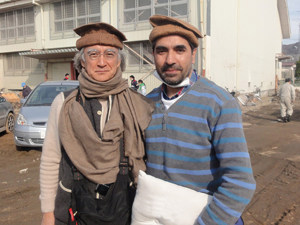
Thinking of the man-made calamity of this time, I wonder where the scientists' conscience has gone. We must nurture and keep a strong conscience to stand up against the authorities even at the risk of our lives if they lead us in the wrong direction. I pray for the swift recovery of Fukushima, home of the great Dr. Hideyo Noguchi, from this catastrophic tragedy. If there is anything Rentai Tohoku can do, we are most pleased to be of help. In fact, as hospitals in the off-limit zones are not functioning properly, I am considering possible plans to provide medical support there.
Lastly, I am afraid I would like to ask for your financial co-operation to support Rentai Tohoku to let us continue our relief efforts. In this regard, any amount of contribution, however small, will be gratefully received.
Thank you for your attention.
Yasuhiko Sata
Representative Director
Solidarity Tohoku Foundation

Our principle of action is "Amenimomakezu".
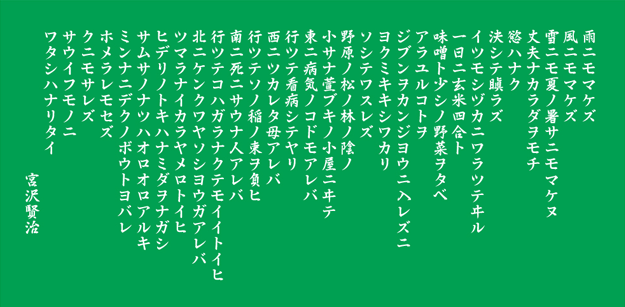
Name of Organisation
General Incorporated Foundation RENTAI TOHOKU-SEINAN
Date of Foundation
May 12, 2011
Our Purpose
RENTAI TOHOKU contributes to disaster relief efforts and future development in the areas affected by the Great East Japan Earthquake by raising charity funds from all over the world, promoting the employment of earthquake and tsunami victims and supporting them to restore their lives.
Our Activities
- We recruit a number of volunteers for providing meal services at evacuation centres and cleaning up residential areas and shorelines of disaster affected areas to support the restoration of local fishery.
- We hold meetings for disaster victims, intellectuals both in and outside disaster areas and other collaborators from overseas to exchange opinions, and provide consultancy services necessary for fishermen and farmers to restore their livelihoods (ex. Assistance for developing business plans).
- In future, we will not only continue voluntary works and organise meetings for relief efforts but also provide further support to disaster victims to rebuild their lives by connecting people between in and outside disaster areas, developing a diversified human network and promoting the transmission of information from disaster areas.

Our approach to support activities
To support earthquake and tsunami victims who have lost their families, homes and belongings to stand up again with courage and rebuild their lives, we will continue to exchange opinions with them and devise the most effective measure of support.
Through specific support actions which allow volunteers to experience a sense of actual contribution to relief efforts, we strengthen the tie with not only supporters nationwide but also international collaborators outside the country.
Our Base Location
Ichinoseki city, Iwate prefecture (Kawasaki and Senmaya).
No. of resident staff: 2
Access by car: about 30 min from Kesennuma/30-40 min from Hiraizumi/ about 60 min from Ofunato/ about 80 min from Ishinomaki
Main activities(as of July 1, 2011)
1)Meal services at evacuation centres
2)Various consultancy services and physical support for fishermen
3)Joint meeting with local fishermen, farmers and forestry workers
4)Car lending service (no charge except fuel expenses and insurance fee. Limited number of cars available)
5)Support for medical professionals
6)Support related to temporary housings
7)Employment support
8)Event organisation in disaster affected areas
9)Support for food service businesses in Tohoku region
Vision for the future
As described above, RENTAI TOHOKU aims at providing recognisable support on a mid to long term basis.
We will appreciate voluntary participation of experts in various fields in our disaster relief efforts.

Our Foundation was established on the 12th May, 2011 (Registered on the 23rd May, 2011) with an aim to support victims in disaster affected areas in Tohoku and help them regain self-reliance. We have focused our volunteer activities on direct communication with people in affected areas, exploring various ways to assist them to rebuild their lives and swiftly putting them into practice.
Based in Kawasaki-cho Ichinoseki, Iwate with two full-time staff, we have been working since right after the earthquake. However, as time goes by, it has become clear that what we volunteers are needed for has been changing. At first, we provided meal services at emergency evacuation centres hoping to comfort tsunami survivors with some hot refreshments. After a while, as they started to move into temporary housings, both their situations and our activities have considerably changed.
Many tsunami victims from various areas are forced to move in a temporary housing complex together. Though families with school-age children are given priority to move into temporary houses near schools, many elderly households have no choice but live in a complex built in remote, inconvenient areas. Apparently, as communication among residents is scarce, heads of each residents' committee at temporary housings have often experienced difficulties in encouraging mutual exchange among committee members. Therefore we have been offering our assistance particularly in that area to encourage residents of temporary housings to mingle with others.
At the symposium on self-supporting efforts held at Ichinoseki on the 29th October 2011, many participants mostly from Miyagi and Iwate, including tsunami victims from Rikuzentakata, Ofunato, Kesennuma and Ishinomaki got together and exchanged opinions.
On the 11th March, 2012, we held the second symposium on self-supporting efforts in Nagoya. Reports were given on reconstruction activities and a number of problems and issues that needed to cope with were presented. We believe that the symposium provided each participant with a meaningful opportunity to think again what they should do or what they could do from the following day for recovery of the area destroyed by the disaster.
Japan is now on the verge of both political and economical crisis. What I have realised through my volunteer activities in Tohoku is that it is not only Tohoku but the entire country that needs immediate action. Now, I think that rebuilding self-supporting Tohoku will save Japan and ultimately the world from critical predicaments now we are facing. I hope that we will be able to expand our activities, though small in scale, from supporting Tohoku to wider sphere- Japan and the world. Also I truly hope that people in Tohoku will regain their footings as soon as possible and show their spirit to support Japan and even the entire world.
On the 12th May, 2012, the first anniversary of the establishment of the Foundation, we decided to change the name of the Foundation from Rentai Tohoku to Rentai Tohoku-Seinan. Tohoku and Seinan means east, north, west and south. In the spirit of the poem, "Rain, I will not be defeated" by Kenji Miyazawa, north, south, east, and west, we will passionately continue to pursue our mission to help people who are in need.
May 2012
General Incorporated Foundation, Rentai Tohoku-Seinan
Representative Director Yasuhiko Sata

